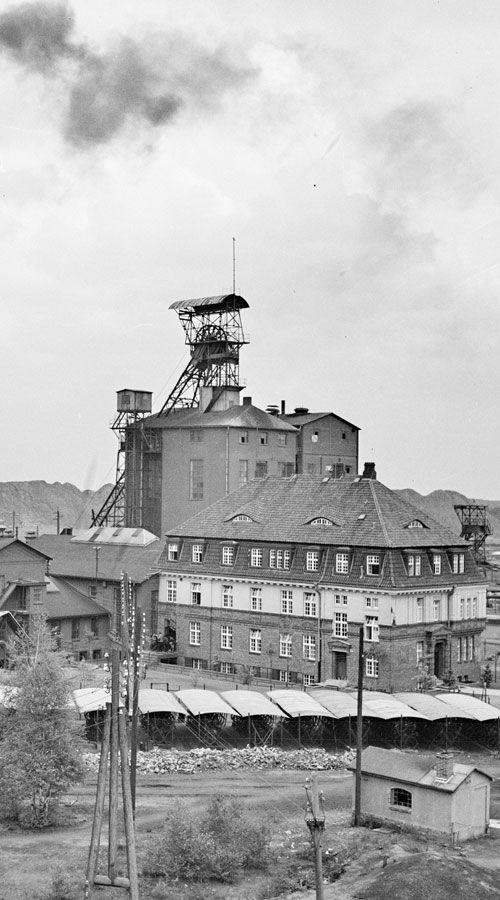The Petroleum Industry in the district of Celle


The shaft and central office at the DEA site in Wietze (Celle district) in 1938.
Crude oil from Celle. A raw material for National Socialist armament policy and warfare
Dominik Dockter, Dr. Jana Stoklasa, Dr. Christian Hellwig und Dr. Rita Seidel
(Institute for the Didactics of Democracy, Leibnitz University Hannover)
The town and district of Celle had a long tradition of oil production: crude oil was already extracted in Wietze in the 17th century, and one of the world’s first oil wells was drilled there in 1858/59. By the 1920s, Wietze had become a central production location for the German oil industry, which had a lasting impact on the economic and social conditions in the region: the Obershagen, Hänigsen and Nienhagen oil fields were the most productive oil fields in Germany in the mid-1930s. Despite fundamental historical studies on German oil policy, this central aspect of Lower Saxony’s regional history has not yet been examined. The IDD project team is therefore analysing the political, social and economic conditions, interrelationships and effects of oil production in the Celle region between 1933 and 1945 and providing an outlook on the period after the end of the war.
DOMINIK DOCKTER compares the professional biographies of the entrepreneurs Karl Große, Günther Schlicht, Hermann von Rautenkranz and Hans Brochhaus, who were all managers at oil companies in the town and district of Celle in the 1930s. He examines the spaces of opportunity that National Socialism offered entrepreneurs, how they utilised these spaces and thus participated in the criminal practices of National Socialism. The importance of Celle as a crude oil location in this development and how the entrepreneurs positioned themselves after 1945 with regard to their actions in the “Third Reich” are also explored. The comparative analysis reveals specifics but also similarities that allow a differentiated interpretation of the business dealings of key oil entrepreneurs from the town and district of Celle during the Nazi era.
JANA STOKLASA, on the other hand, focuses on the social reality of work and the National Socialist company policy of DEA at the Wietze mineral oil works. After drastic personnel and socio-political cuts as a result of the global economic crisis, the working conditions of the workforce improved to some extent with the economic recovery. New labour law regulations and measures to promote the company community were intended to increase the loyalty of the workforce to the regime. At the same time, these measures put the workforce under pressure to adapt to National Socialist company policy.
During the Second World War, working conditions deteriorated drastically due to austerity measures, forced labour and conscription. At the end of the war, the adaptation to the Nazi regime culminated in the military deployment of the employees in the Volkssturm (i.e. mass national conscription to a national militia) in Wietze and the occupation of the company premises by British Allied troops. The example of the DEA operations in Wietze can be used to illustrate the multifaceted interweaving of political, entrepreneurial and social interests in the oil companies of the town and district of Celle during the so-called "Third Reich".
CHRISTIAN HELLWIG’s section focuses on the use of forced labourers in the oil-producing companies located in the rural and urban district of Celle. For DEA, for example, the sources preserved in the Arolsen Archives alone show that 206 foreign workers were employed at the Wietze site up to 10 April 1945. Despite the gaps in the sources, the sources that still exist today also make it clear in this case that the National Socialist system of forced labour and exploitation was a crime committed by an entire society that by no means took place in secret, but in public.
RITA SEIDEL examines the history of the Reich Institute for Petroleum Research at the Technical University of Hanover and investigates the role it played in National Socialist armament policy and warfare from both a scientific history as well as an economic and regional history perspective. The Institute was an establishment of the “Four-Year Plan”, which was used to advance the Nazi regime’s efforts to achieve autarky and its preparations for war. The Institute, which opened in 1943, received considerable human and financial resources. In the Federal Republic of Germany, it continued to work on the basis of the foundations laid in the 1940s.
About the research project
The research project carried out at the Institute for Didactics of Democracy (Leibniz University Hannover) focuses on the history of crude oil production in the city and district of Celle from the 1930s to the 1950s. The third-party funded project is supported by the Lower Saxony Ministry of Science and Culture as part of the PRO*Niedersachsen programme. The German Oil Museum in Wietze is an important cooperation partner. More information on the ongoing research project can be found on the Homepage and the Blog of the Institute for Didactics of Democracy.